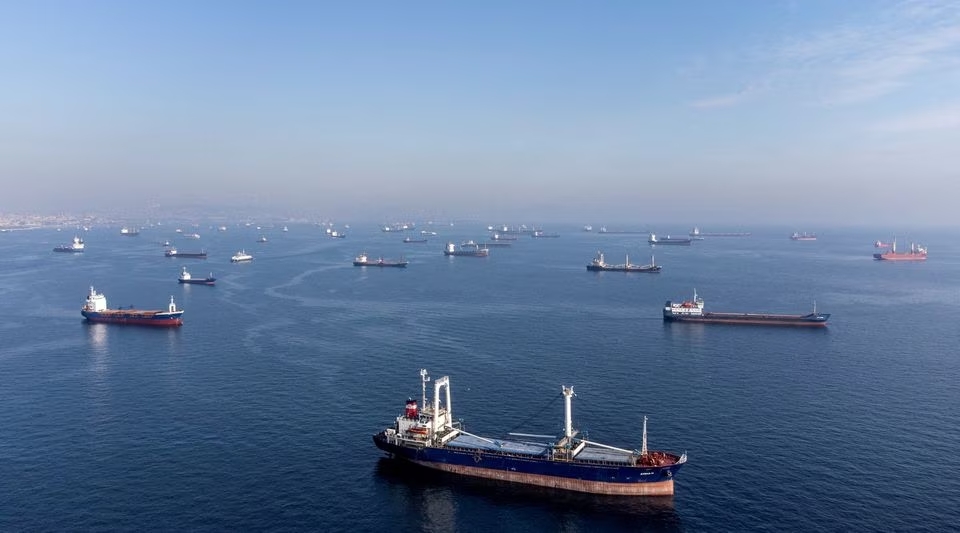Ukraine’s Ministry of Infrastructure announced on Monday that Russia effectively stopped the “Black Sea Grain Initiative” by refusing to register and inspect the incoming vessels.
In a post published on its official Facebook page, the Ministry said that Russia’s approach is completely contrary to the terms of the current agreement and makes it impossible to draw up an inspection plan. The plan requires daily approval by all parties for both exit and entry.
The ministry further added that 90 vessels are currently awaiting inspection in Turkish territorial waters, of which 62 are being loaded.
“Ukraine categorically rejects Russia's attempts to stop the registration and inspection of the incoming fleet, which should take place in view of the Initiative's work,” the Ministry added. “We look forward to the position of our partners, the UN and Türkiye.”
Shipments via the Black Sea become possible after Ukraine and Russia inked separate but identical grain-and-fertilizer export agreements in Istanbul in July 2022.
The landmark agreement brokered by Türkiye and the United Nations allowed the resumption of Ukrainian grain exports through the Black Sea ports that were blocked since Russia launched what it called a “special military operation” on February 24, 2022.
Millions of tonnes of grain were trapped in the country’s silos, causing a surge in food prices, as well as fears of a global food crisis.
As part of the deal, Ukraine resumed grain exports through its ports in the Odesa region, while Moscow secured guarantees for its own grain and fertilizer exports. Last August, Russia expressed its willingness to adjust the terms of the deal to ensure more food supplies reach the poorest countries in Africa and Asia.
Moscow has repeatedly warned that it may not extend the grain deal beyond its next expiration on May 18. The deal is supposed to be renewed every 120 days. When the agreement was last renewed in March, Russia consented to a 60-day extension.
The Kremlin has set forward a number of requests, including the reinstatement of the Russian Agricultural Bank into the SWIFT global payment system, the restart of farm equipment exports to Russia, and the removal of limitations on insurance and port access for Russian ships and cargo.
The Black Sea region, which includes Ukraine, is a key hub for grain exports, with Russia also a major producer and exporter of grain.
The Black Sea grain deal between Russia and Ukraine is an important aspect of the global grain market, particularly for countries in the Middle East and North Africa region, which are major importers of Ukrainian wheat and corn. Any disruption to its grain exports would have significant economic and geopolitical consequences and cause a global food crisis.
Ukraine and Russia are both significant food suppliers, accounting for 29 percent of wheat exports and 80 percent of sunflower exports globally. The exports are mainly through the Black Sea.
Ukraine, known as one of the world's breadbaskets, is a top grain supplier to dozens of developing countries. In 2021, the country's grain exports totalled $12.2 billion, accounting for nearly a fifth of the country’s total exports.
Prior to the war, Ukraine exported 98 percent of its cereals and oilseed via the Black Sea, at a rate of up to 6 million tonnes per month. But with the ports blocked and the railway system unable to cope with the extra volume, the country was only exporting between 1-1.5 million tonnes a month.







 Iran's senior military leaders described the drone and missile attack on Israel on April 14 night as “successful".
Iran's senior military leaders described the drone and missile attack on Israel on April 14 night as “successful".
 Iranian Foreign Ministry Spokesperson Nasser Kanani warned of “geopolitical rivalries”, commenting on a recent high-level meeting between Armenia, ...
Iranian Foreign Ministry Spokesperson Nasser Kanani warned of “geopolitical rivalries”, commenting on a recent high-level meeting between Armenia, ...
 Iran's President Ebrahim Raisi extended condolences to the Chairman of the Political Bureau of the Palestinian Hamas group, Ismail Haniyeh, followi...
Iran's President Ebrahim Raisi extended condolences to the Chairman of the Political Bureau of the Palestinian Hamas group, Ismail Haniyeh, followi...



